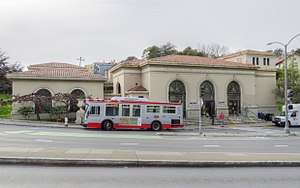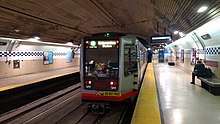Forest Hill station (Muni Metro)
 Forest Hill station headhouse in 2018 | |||||||||||||||||||||||||||||
| Location |
Laguna Honda Boulevard San Francisco, California | ||||||||||||||||||||||||||||
| Coordinates | 37°44′53″N 122°27′33″W / 37.74803°N 122.45914°WCoordinates: 37°44′53″N 122°27′33″W / 37.74803°N 122.45914°W | ||||||||||||||||||||||||||||
| Owned by | Muni | ||||||||||||||||||||||||||||
| Line(s) | Twin Peaks Tunnel | ||||||||||||||||||||||||||||
| Platforms | 2 sides | ||||||||||||||||||||||||||||
| Connections |
| ||||||||||||||||||||||||||||
| Construction | |||||||||||||||||||||||||||||
| Disabled access | Yes | ||||||||||||||||||||||||||||
| History | |||||||||||||||||||||||||||||
| Opened | February 3, 1918[1]:70 | ||||||||||||||||||||||||||||
| Closed | June 25-August 24, 2018 (temporary)[2] | ||||||||||||||||||||||||||||
| Rebuilt | 1985 | ||||||||||||||||||||||||||||
| Services | |||||||||||||||||||||||||||||
| |||||||||||||||||||||||||||||
| Designated | 2004[3] | ||||||||||||||||||||||||||||
| Reference no. | 231 | ||||||||||||||||||||||||||||
Forest Hill Station is a Muni Metro station near the Forest Hill and Laguna Honda neighborhoods in San Francisco, California. It was originally built as part of the Twin Peaks Tunnel in 1916-1918, and is the oldest subway station west of Chicago. The station was originally named Laguna Honda; lettering with that former name is carved on the station headhouse.
Scenes from the films Dirty Harry (1971) and Milk (2008) were shot inside of this station.
The station is temporarily closed during the Twin Peaks Tunnel shutdown until August 2018.[2]
Station layout and architecture

Forest Hill Station was built in a "restrained classical revival"[4] style which has remained largely unaltered to the present. There are also a few decorative features suggestive of an Art Nouveau esthetic, for example malachite colored accents placed over the elevator doors.
The station consists of two side platforms next to the tracks far below the surface. Forest Hill Station is located deeper underground than any other Muni Metro station; so much so that, unlike other stations, most people use an elevator to reach the platform at Forest Hill. Unlike all other underground Muni Metro stations, there is no underground concourse mezzanine level directly above the platform level. Instead, the concourse level is in a station building on the surface.
Forest Hill and Eureka Valley stations were originally constructed with low platforms, as streetcars of that era had steps to load passengers from street level. However, the six new Market Street Subway stations, as well as West Portal station, were built with high-level platforms for speedier level boarding onto the new Boeing LRVs. With Eureka Valley permanently closed, Forest Hill was left as the only low-platform station on the Muni Metro subway. Muni soon modified the station with high-level platforms, elevators for handicapped access, and ventilation improvements. The $6 million project, which upgraded Forest Hill to equal the new stations while keeping its historic architecture, was completed in 1985.[5]
See also
References
- ↑ Perles, Anthony (1981). The People's Railway: The History of the Municipal Railway of San Francisco. Interurban Press. ISBN 0916374424.
- 1 2 "Twin Peaks Tunnel Improvements". San Francisco Municipal Transportation Agency. June 25, 2018. Archived from the original on June 26, 2018.
- ↑ "City of San Francisco Designated Landmarks". City of San Francisco. Retrieved 2012-10-21.
- ↑ Susan Dinkelspiel Cerny. An Architectural Guidebook to San Francisco and the Bay Area. Santa Barbara, Gibbs-Smith, 2007 p96-7
- ↑ "Chapter 1". Muni Metro Turnaround Project: Final Enivironmental Impact Statement. United States Department of Transportation Urban Mass Transportation Administration. August 1989. p. 1-2 – via Internet Archive.
External links
![]()